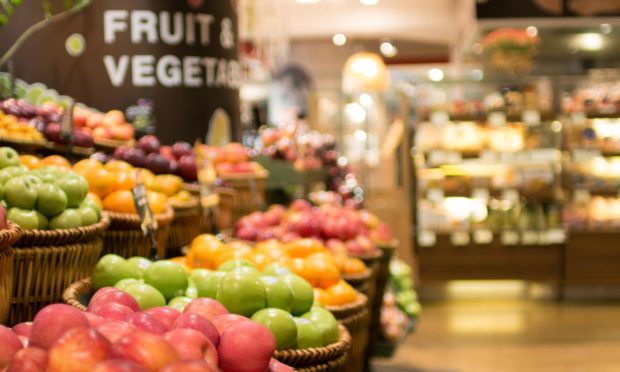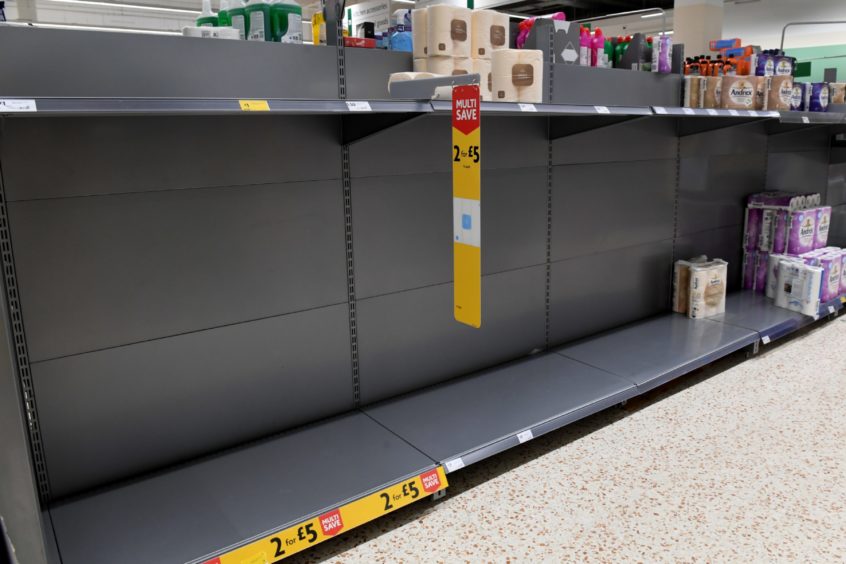With concerns over the ongoing French ban on freight travel due to the discovery of a mutant coronavirus strain, there have been anecdotal reports of empty fruit and vegetable shelves in some supermarkets.
While there are concerns over potential shortages of some imported fresh produce in the next couple of weeks if the ban is not lifted soon, the First Minister Nicola Sturgeon has urged shoppers not to panic buy, with stores well stocked for Christmas.
Ms Sturgeon said: “We have been assured by supermarkets that they are well stocked for Christmas, so there is absolutely no need for people to buy any more than you normally would.
“I would ask everybody to please support each other and shop responsibly.”
Speaking to Parliament at her daily briefing on Tuesday she added: “This situation is serious, it’s urgent and for our food exporters it is rapidly deteriorating. It needs the UK Government to reach an agreement with France without delay to get freight moving again. There is simply no time to lose.
“We have no immediate concerns about food supplies. Supermarkets are well stocked and so there is absolutely no need for anyone to buy more than planned in the run up to Christmas.
“If the situation is not resolved in the next day or so we may start to see some pressure on fresh produce after Christmas but that is not a concern right now and I hope it will not arise at all.”
Any instances of panic buying seem to be occurring at large supermarkets with a spokesman for the Scottish Grocers Federation saying local convenience stores remained well stocked.
He said: “It seems to be a bit of an issue in supermarkets but our members aren’t seeing any issues yet.
“Most convenience stores will have access to both a national supplier (eg their wholesale partner) and a local supplier and so we might be a bit better placed, at least in the short term.”
‘Shop as normal’
Britain’s biggest supermarket Tesco said it had plenty of food for Christmas as it also encouraged customers to “shop as normal”.
“We’ve been building our stockholding of key products ahead of the Christmas peak and are working closely with our hauliers and suppliers to continue the supply of goods into our stores,” a statement said.
“We’re doing everything we can to limit the impact for our customers.”
The supermarket giant is looking at using ferries direct from Spain and increasing stock from the UK to deal with the disruption.
But it warned that “there may be reduced supply on a few fresh items, such as lettuce, cauliflower and citrus fruit later this week, but we don’t expect any problems with availability on these lines today or tomorrow”.
Ban must be lifted
Sainsbury’s warned salad and greens could run out if the French do not lift their ban after 48 hours.
A spokesperson said: “All products for the great British Christmas lunch are already in the country and we have plenty of these. We are also sourcing everything we can from the UK and looking into alternative transport for product sourced from Europe.
“If nothing changes we will start to see gaps over the coming days on lettuce, salad leaves, cauliflowers, broccoli, citrus fruit – all of which are imported from the EU at this time of year. We hope UK and French governments can come to a solution that prioritises immediate passage of produce and food.”
UK Government Home Secretary Priti Patel said that although 20% of goods come through the short straits, “there is plenty of food in the supermarkets”.
She added: “We have fresh produce coming in through other routes as well, through air freight and not just through the short straits, so I think we have to just take a balanced approach to this.”
Big backlog
With hundreds of lorries reportedly waiting at Folkstone in Kent to gain passage to Europe, Scotland Food and Drink chief executive James Withers warned on Twitter: “BBC briefed that plans will be set out later on restarting freight movements between UK & France. Unlikely to start before Wed. And big backlog to clear. Kills off any lingering hopes of some pre-Xmas deliveries for most Scottish food exporters.”
He later added: “Lots of debate overnight about whether there are 170 or 900 trucks on motorways in Kent. Both these figures miss the scale of the problem. The number of trucks currently parked up in the UK and not where they should be is in the 1000s.”
Yesterday, Mr Withers said £5 million of Scottish food and drink produce would be heading into France daily this week.
Lots of debate overnight about whether there are 170 or 900 trucks on motorways in Kent. Both these figures miss the scale of the problem.
The number of trucks currently parked up in the UK and not where they should be is in the 1000s.— James Withers (@scotfoodjames) December 22, 2020
‘Well stocked’
David Lonsdale, director of the Scottish Retail Consortium, said food stocks are good, but hauliers are worried about sending drivers to the UK as they can’t be sure when they will return.
He said: “Grocers and supermarkets are well stocked with food in their stores and warehouses, indeed more so than normal due to it being Christmas time and also with the end of the Brexit transition coming in to view.
“Retailers continue to carefully monitor developments, however the closure of the French border to UK traffic does pose difficulties for the UK’s capacity to import fresh produce. While goods can enter from France, few hauliers are willing to send trucks and drivers across to the UK without a guarantee they can return in a timely manner. The channel crossings see 10,000 trucks passing daily during peak periods such as the current run up to Christmas.
“Retailers have stocked up on goods ahead of Christmas which should prevent immediate problems. However, we support the EU commission which says ‘cargo flows need to continue uninterrupted’.
“A solution must be found soon to reopen the borders and so avoid any substantial impact on the supply of some fresh foods, such as salad, vegetables and soft fruits. If Covid testing is required, it needs to be quick to avoid adding friction to the supply chain. We have stressed to government there is no alternative to reopening the channel ports, given that it is a key supply route for fresh produce at this time of year.”
“Grocery retailers are adept at coping with unexpected events and most have well-developed contingency plans in place to deal with any disruptions that may emerge. Consumers are encouraged to continue to shop as normal rather than buying unnecessary quantities of food or drink.”



